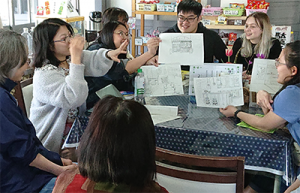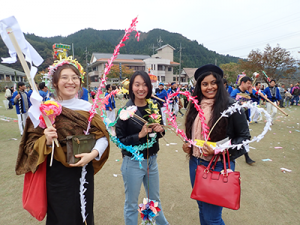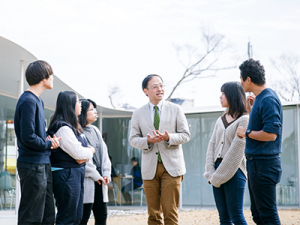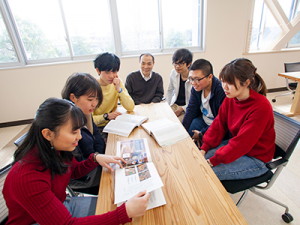
Okayama University
Okayama University is proactively engaged in the promotion of the Sustainable Development Goals (SDGs), and is thus striving to educate talent able to solve societal issues as outlined by the SDGs. As part of this, the University is focusing on practically engaging the local community, ultimately drawing lessons that can then be applied to a global context.
At the Discovery Program for Global Learners (hereafter Discovery Program), students learn fundamental knowledge and practices to start up a social enterprise or NGO/NPO through modules offered in Social Innovation and Entrepreneurship (one of three areas that students can choose). The goal is to nurture students who are finely attuned to our societal issues, being able not only to develop innovative ideas to solve them but also to realize these ideas through the acquisition of organizational management skills.
Learning together with the local community in Japan
The International Development class allows students to gain practical experience in the local community, using the principles of service learning to contribute to the regional society. There are many lessons that can only be learned by stepping outside the classroom and establishing a connection with the people that shape the community.

Students discussing their ideas with local residents in Josai District, Tsuyama City, in April 2019
Exemplary of this mindset, Okayama University held the “Tsuyama Ideathon” in 2019, on-site at Tsuyama City in Okayama Prefecture. Members of the local community, including high school students, got together to learn about local issues, which were then discussed as part of a workshop and debrief session together with Okayama University students. At the debrief session, about 40 participants attended, including Tsuyama City government officials, members of the Tsuyama Tourism Association and Tsuyama Chamber of Commerce and Industry, NPO representatives, local citizens, and high school students and teachers in the area. The purpose was to come up with new ideas, solutions and perspectives in the context of the area’s issues and greater vision.
Such activities have also extended beyond borders. As part of an on-site learning opportunity for students in Bangkok, Thailand, participants were exposed to local issues, including crime, rural poverty or employment for handicapped persons and ex-convicts. They then visited social enterprises directly dealing with these issues. These included organizations engaging in ethical fashion, community-based tourism, developmental technology and micro-crediting. Furthermore, at the School of Global Studies at Thammasat University, a collaborative lecture was held. Here, issues facing both Japan and Thailand were outlined and compared, with students from both universities discussing potential solutions jointly.

Students participated in the annual Flower Festival at Hachiman Shrine, Aba District in November 2019
Back home in Japan, another on-site learning example took students to Aba, part of Tsuyama City in Okayama Prefecture, where they connected with both nature and the local community through assisting in the preparations for the annual Flower Festival. Engaging with a community that faces population ageing, the students created contents as part of tourism promotion activities. They also aimed to contribute to the regional society by inviting local elementary school students to a nature experience.
Dr. Ken Aoo, who teaches the International Development class, summarizes: “Our students learn the importance of being exposed to a wide variety of ideas, considering these and ultimately cooperating with their peers. With regards to the serious issues of our time, it is important to consider and engage with stakeholders beyond the non-profit sectors, including governments and private enterprises. The SDGs are thus an important concept creating a common language. I hope that our students use the practical experiences they gain here to challenge our societal issues from a wide variety of stances.”

Professor Ken Aoo with students from Indonesia, Vietnam, Japan (Okayama) and Japan/South Africa
Studying non-profit management from the perspective of philanthropy
The Philanthropy and Non-profit Management course outlines how non-profit organizations and social enterprises can change society, focusing on their status as an autonomous entity devoted to the public good. Through instruction that include a focus on management skills, it is another class that aims to develop leaders engaging with and solving societal issues.

A group session with Professor Takayuki Yoshioka
Professor Takayuki Yoshioka, who studied philanthropy in the United States and has experience managing a non-profit organization, says that “in Japan, there is no other university where you can study the perspective of philanthropy. I think this is definitely a unique learning experience. To start up an NPO, you need both a strong vision as well as organizational management skills to ensure continuity. I firmly believe that the lessons learned from my class are useful for students in the future, when they are engaging in societal problem-solving – in whatever capacity that may be.”
The Discovery Program places a unique emphasis on gaining practical experience in the local community, all the while providing a global environment through its multinational student body. Through this dynamic, it aims to nurture future leaders in social sustainability.
(Witten by Maximilien Rehm and Mariko Fukui, Aalto International)

